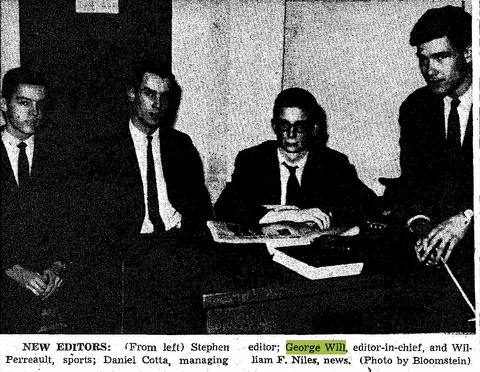Savannah Brooks ’26
Managing Editor
Trinity alumnus George Will ’62 will be honored for achieving a 50 year tenure as an opinion columnist with the Washington Post. This honor will take the form of a package published the week of Nov. 18 with materials recognizing him as one of the most prolific and well-known opinion columnists of the last half-century.
Will, who is primarily known as a conservative thinker who has also written extensively about baseball, received the Pulitzer Prize for commentary in 1977 and has served as a contributor for Fox News as well as a news analyst for ABC. His opinion columns, while mostly focused on politics and current events, have covered a range of topics from his role in Ronald Reagan’s 1980 debate prep to MLB rule changes. A close Reagan ally, Will has criticized George W. Bush, John McCain and Donald Trump in what Will has described as a more libertarian shift in his beliefs. In the 2024 election, he supported Kamala Harris, but has also called the election “the worst presidential choice in U.S. history.”
In an interview with the Tripod, Will discussed his time at Trinity and his storied career. After graduating from Trinity with honors in religion, Will studied philosophy, politics and economics at Magdalen College, Oxford before receiving his Ph.D from Princeton University. After graduating he worked in politics and academia before beginning his career with the Post in 1974 as part of a larger push for more conservative academic thinkers writing opinion pieces for major newspapers.
“I became a columnist in January, 1973 at exactly the moment when Judge Sirica in Washington was imposing draconian sentences on the Watergate burglars,” Will told the Tripod. “By March, three months into my first career as a columnist, I was pretty stringent in my criticisms of Nixon. So, the whole marketing program for selling me as a Nixon supporter fell apart.”
Despite his new position with the Post, Will was no stranger to journalism. During his time at Trinity, Will wrote for the Tripod often; in his sophomore year, he became Sports Editor, and served as Editor-in-Chief in 1961. When asked about the difference between the Tripod during his tenure and today, Will said “The most striking fact of campus life for the last 10 years is that campuses have become the least hospitable places in America to first amendment values and to vigorous controversy. The cancel culture and all of that. Poll after poll shows that a significant minority and sometimes a plurality of students think it is just fine, sometimes, to shut down and disrupt speakers who are saying hurtful, harmful things. Now everybody says that if their feelings are hurt, they’re harmed. If they’re upset by ideas, they’re harmed. If some group feels disadvantaged by what a speaker says, they’re harmed. I would say that the most important thing the Tripod can do is try to immunize Trinity against this virus of intolerance and sensitivity and skepticism about the values that the First Amendment exists to protect.”
Will is notorious for his frequent references to philosophers in his columns and books (a 1990 Saturday Night Live Sketch, in which Dana Carvey plays Will, satirizes Will’s propensity for discussing the philosophy of baseball). During his time at Trinity, where he majored in religion, “he got interested in [political philosophy]” and described himself as a “young aspiring intellectual.” While he often credits his time in Oxford for his conservatism, he was certainly involved in politics at Trinity, co-chairing the Students for Kennedy group and leading a split from the national chapter of his fraternity, Delta Phi, over concerns that the national chapter was not inclusive of nonwhite and Jewish students. Since the Trinity chapter was required to follow national rules, Will aimed to create a new, local chapter that was more inclusive.
Will is not alone among famous Trinity alumni who have gained prominence commenting on politics and current events; regarding Tucker Carlson ’91, Will argued that Carlson is no conservative at all. “Conservatives used to be for welcoming policy on immigration, against industrial policy, for free trade, for a muscular foreign policy. You go down a list of things that traditional Reagan, Eisenhower kind of conservatives believed, Tucker will disagree with 19 of them and be agnostic on the 20th. He goes where the wind blows on his side of MAGA world. But, the MAGA people, to their limited credit, have been nothing if not clear when saying that traditional conservatism has no appeal to them.”
While Will graduated from Trinity with honors, he blames “any shortcomings of my education” on his frequent travels to New York and his “having too much fun.” His time at Oxford, he said, taught him how to be a “self-starter intellectually” and gave him his now-constant habit of reading. He often credits his success in journalism on his voracious reading and encourages those students interested in the field to read as often as they can.To view Will’s anniversary package, those interested can visit the Washington Post’s website starting the week of Nov. 18. Will continues to write biweekly columns with the Post covering politics, foreign policy, social issues and much more.




The Tripod’s celebration of George Will’s illustrious career as a columnist has led me to recall my one and only encounter with this titan of America’s corporate-controlled journalism. It was in the spring of 1968. As I stopped at the Cave for my regular afternoon coffee, Professor George Cooper — chairman of the History Department — invited me over to his table. Seated with him was a bow-tied man in his twenties, whose pained facial expression resembled that of an individual suffering from a tooth ache. “I’d like you to meet George Will,” Cooper said amiably. “He was my student and also edited the Tripod.” I do not recall anything that Will said after this introduction. Within a few minutes, he got up from the table and was on his way.
After Will had taken his leave Cooper told me that Will, while a student, had been involved in a campaign to win commutation of a young Black man, Benjamin Reid, who had been sentenced to death for murder. Cooper recalled that he had assisted Will in this campaign, helping him obtain access to leading Democratic Party politicians in the state. Ultimately, the campaign was successful. Reid’s sentence was commuted to life imprisonment. When he saw Will shortly after the announcement of the commutation, Cooper said, “Congratulations. But I suspect that this is the last decent thing that you’ll ever do in your life.”
What had led Cooper to make such a harsh statement? “George is a very ambitious young man,” Cooper explained. “What interests him is not the cause itself, but the opportunity it provides for his career.”
Looking back over the Will’s career, it seems to me that George Cooper’s appraisal was correct. No doubt, Will is intelligent, knowledgeable (especially about baseball), and a talented writer (His style of speaking and writing, though not what he says and writes, reflects the influence of Cooper). But he has placed these skills at the service of the rich and the powerful, and for this Will has been amply rewarded. His career is entirely bound up with the right-wing turn in American politics heralded by the election of Reagan in 1980. Will made a professionally questionable contribution to Reagan’s victory by secretly coaching the candidate in preparation for a crucial debate with Jimmy Carter (which the Tripod references without explanation of its significance). In the years that followed, Will acquired the reputation of being a favored journalistic courtier of the Reagan administration.
Will’s unflagging endorsement of the Reaganite agenda was complemented by his support for American militarism and its brutal acts.
In a column dated April 7, 2004, during the US occupation of Iraq, he wrote in his Washington Post column: “Regime change, occupation, nation-building—in a word, empire—are a bloody business. Now Americans must steel themselves for administering the violence necessary to disarm or defeat Iraq’s urban militias…”
One week later, on April 14, 2004, Will unleashed another homicidal tirade in the Post: “After Fallujah, it is clear that the first order of business for Marines and other U.S. forces is their basic business: inflicting deadly force.”
The Tripod should have adopted a more critical attitude toward its interviewee. As written, the interview seems to be joining in the celebration of Will’s success, without any particular concern for the means by which it was achieved.
I agree with George Will on many Topics However, I think the Modern 21st Century has more examples of Militaries not using Force to acquire Victory.